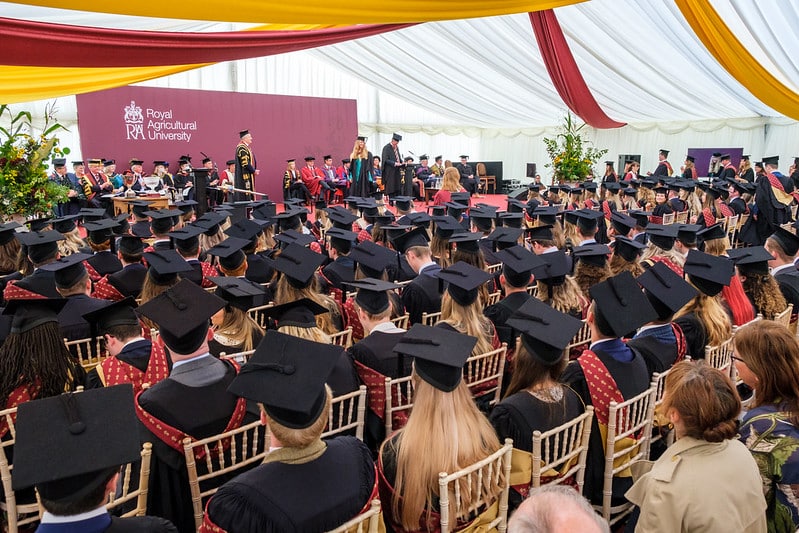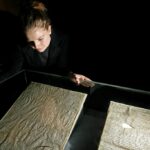There is nothing better than starting a career with the intention to make the world a better place. And while actions play a huge role, even more significant is the research that targets specific issues and looks to solve them, especially in agriculture.
This is what Nigerian student Folasayo Olayunju wants to be part of. He has plans to build a career in sustainable agriculture, focusing on rural communities in developing countries. “I’d like to be involved in improving the livelihood in sub-Saharan Africa through improved crop productivity,” Olayunju says.
He picked the Royal Agricultural University (RAU) to be his stepping stone, simply because he knew he would get the best, with its flexibility and active researchers as lecturers. “I have been exposed to the practical world of sustainable and integrated food production in the UK with three farm visits within a short period of time,” says the MSc Sustainable Agriculture and Food Security student.
Based in Cirencester, Gloucestershire, RAU stands out for how it equips students to meet pressing global challenges and inform future policy on global population, climate change, resource limitations, sustainability and food security.
It is proud to be at the forefront of agricultural education and a key contributor to the land-based sector for over 175 years. Research here is “world-leading and internationally excellent” as assessed by the Research Excellence Framework (REF 2021). And its three main goals are feeding the world in a changing environment; sustaining and restoring the global environment and enabling and revitalising Global Britain in a post-Brexit and Covid world.
Teaching here is just as high calibre. It is rated one of the top six business schools in Europe for studying Rural Land Management (ceoworld.biz, 2022). Professors are authors of the National Food Strategy and Nutrients Management Strategy, which are the two key initiatives in agriculture to support the government’s objective of achieving net-zero carbon emissions.

Programmes are designed to equip students to be workforce-ready. Source: Royal Agricultural University.
They bring to life programmes like the MSc Business Management and the MSc Agricultural Technology and Innovation — showing students how they can make a difference in various fields. The former combines a curriculum that seeks to meet the UN Sustainable Development Goals with elective modules like Advanced Equine Business Management and Farm Business Management. The latter explores how developments in sensors, robotics, automation, analytics and telematics are enabling new and sophisticated ways of managing agricultural practices.
Whichever programme they choose, RAU students have plenty of opportunities to take their learning beyond the classroom and the country. Discussions and group work are dynamic, with the campus being home to over 42 nationalities and study abroad opportunities available at seven universities in China and the US, including the recently opened International Agriculture University, a new partner university in Taskhent, Uzbekistan.
Such a global approach to learning lets students master the practical and theoretical skills that open doors to new opportunities — including finding solutions to today’s top climate challenges.

Students have access to research centres and labs to assist learning. Source: Royal Agricultural University
For Abdullah Jehanzeb from Pakistan, this starts with uplifting smallholder farmers from subsistence farming into small-scale commercial agriculture. By joining a development organisation, he believes he can make an impact in this sector. “Specialised modules, learned faculty, and driven peers are all contributing towards my preparation to take on greater roles in the future,” the MSc Sustainable Agriculture and Food Security student says.
The highlight of his experience thus far? The frequent farm visits.
“Whether part of the course or a student trip, physically witnessing the theoretical concepts studied in class has enhanced my understanding in these areas,” says Jehanzeb.
Practical exercises ensure every RAU student evolves into an employable and enterprising graduate. Beyond experiential learning like farm visits, there is the successful Social Enterprise programme Cotswold Hills Wine. Students can participate in various stages of the business, from harvesting the grapes to developing the branding and marketing the product.
They can gain insights at the 15,000-acre Bathurst Estate or with over 100 agricultural businesses as well. Those who want to start their own business can find support at Farm491 at the RAU’s Alliston Centre, the UK’s leading agri-tech business incubator and accelerator with 33 million pounds in investment.
At every step of the way, RAU students have real support from their campus family. At the university ranked first in the UK for Learning Communities and fourth for overall satisfaction and the safest in England and Wales, everyone’s welcome, doors to academics are always open, and well-being drop-ins are frequent. There’s even a free shuttle bus from the town centre in the evening.
Follow Royal Agricultural University on Facebook, LinkedIn, YouTube, Instagram, Twitter and TikTok










